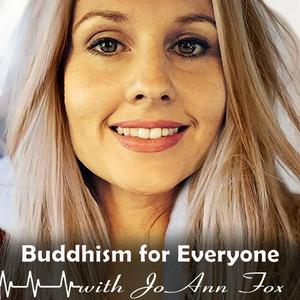Episode 211 - Let Love and Hope Rewrite the Story
We're exploring a truth so simple yet profound it almost feels like a secret; every problem we have comes from just one thing--our own mind. Specifically, our problems come from misperceiving reality: we see our worries, fears, and stresses as big, immovable mountains. In reality, they're more like clouds, shifting and changing with the winds of the mind. Nothing is as fixed as it seems. Everything depends on perception (even that thing you're stressing about right now). Could we change our perception and enjoy whatever arises? Buddhist Teacher, JoAnn Fox, offers two ways to practice this wisdom. Practice 1 Radical Love "The universe is an example of love. Like a tree. Like the ocean. Like my body. Like my wheelchair. I see the love." "I love every thing in the universe. That's all I do all day." --Ram Dass What if we opened our hearts wide enough to love everything that arises — the sweet, the strange, the inconvenient, and the miraculous? This practice invites us to shift our perception and welcome everything that happens. This practice is not about pretending things don't hurt or denying difficulty—but softening into life so deeply that we stop resisting what arises. What we perceive depends upon the mind that perceives it. For example, the mind of anger perceives irritating or threatening things. Conversely, when the mind is pervaded by love, that mind loves whatever it sees. Could we train our minds to love everything we see? A long line, a loud neighbor, a mistake, a moment of joy, a compliment… each becomes a chance to stay open. Today, try saying, "I love this," no matter what happens. Just see how it feels. Maybe you'll catch a glimpse of the blissful mind that can love it all. Practice 2: What's the best that could happen? The mind of worry conjures up what we fear. The worst-case scenario hasn't happened and may not happen, but we let these figments of our imagination torment us. Instead, we can practice a beautiful little mind trick: instead of thinking, "What's the worst that could happen?" we'll contemplate, "What's the best that could happen?" Perhaps everything will play out in ways that are incredibly healing or positive; there's no way to know for sure. So why not plant hope instead of fear and watch what grows? This small shift can reveal a whole new way of experiencing your life. Whoever Knows [one’s own] former lives, Sees both the heavens and states of woe, Has attained the end of birth, Is a sage, perfected in the higher knowledges, And has perfected all perfections, I call a brahmin. (423) --Buddha, The Dhammapada Verse 423 References with Links Buddha (1986).The Dhammapada: Verses and Stories, Verses 419 and 420. Translated by Daw Mya Tin, M.A. (Website). Edited by Editorial Committee, Burma Tipitaka Association Rangoon. Courtesy .of Nibbana.com. For free distribution only, as a gift of dhamma. Retrieved from https://www.tipitaka.net/tipitaka/dhp/verseload.php?verse=423 Tsering, Geshe Tashi (2005). The Four Noble Truths: The Foundation of Buddhist Thought Volume 1 (Kindle). Wisdom Publications. *** To register for two free virtual classes, “Developing Universal Love and Compassion” on Saturday, May 10 and 17, 2025 visit www.BuddhismForEveryone.com Find us at the links below: Facebook:https://www.facebook.com/Buddhismforeveryone Facebook Group:Join our private group at: https://www.facebook.com/groups/sanghatalk/ Instagram: https://www.instagram.com/buddhism.with.joann.fox X: @Joannfox77 TikTok: @buddhism4everyone

